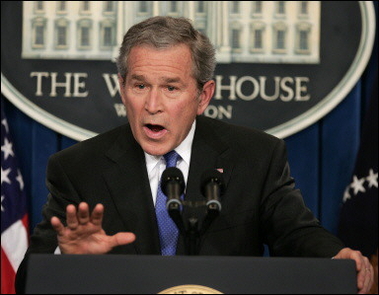|
US denies economic threat from India, China
(AFP)
Updated: 2006-02-02 19:04
Top US officials painted a bleak picture of Europe's job growth and put a
premium on competing with India and China, but denied that either posed a
"threat" to US economic interests.

US President George W. Bush. Top US officials painted a bleak
picture of Europe's job growth and put a premium on competing with India
and China, but denied that either posed a "threat" to US economic
interests. [AFP] |
The officials briefed reporters a day after US President George W. Bush
called in his annual State of the Union speech for enhancing the teaching of
math and science in US schools and for sharply increasing scientific research.
In his speech, Bush warned that the United States "cannot be complacent" and
warned that "we are seeing new competitors, like China and India, and this
creates uncertainty, which makes it easier to feed people's fears."
But "this is not about going up against China and India," said John
Marburger, the director of the White House's office of science and technology
policy. "This is about leading the world."
Labor Secretary Elaine Chao said that job creation had been "one of the
greatest areas of concern" at the World Economic Forum in Davos, Switzerland,
but painted an upbeat picture of employment in the United States.
"Our country is leading the way among major industrialized nations in terms
of job creation. Germany and France have permanent unemployment rates in excess
of 10 percent. And job creation in Europe has basically been stagnant over the
last 10 years," she said.
Amid concerns in the US public and the media about Chinese economic growth
and the so-called outsourcing of jobs to India, Marburger insisted that: "We're
not responding to a threat, we're maintaining a leadership role."
"I believe the strength of this nation is such that all other countries are
trying to do it the way we do it, and the only way that we can maintain our
leadership role is to do it better," he said.
Energy Secretary Samuel Bodman said Bush's proposals, if enacted, would bring
about "a renaissance for United States science and global competitiveness"
helped in part by government-funded laboratories.
"We have helped contribute to America's leadership in the key scientific
fields that have dominated the last century and that we believe will dominate
the century that has just started," he said.
"In this new century, those are the fields of biotechnology, nanotechnology,
material science and high-speed computation," said Bodman.
|